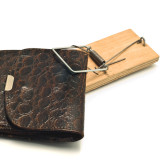Looks can be very deceiving. At least that’s the case should you decide to dispute a purchase you made using a prepaid, debit or credit card. While they can all look like the same hunk of plastic –and function with a quick swipe – there’s a very big difference in the legal and consumer rights that back you up if you are unhappy with the quality of the goods that you purchased and enter into a dispute with a merchant.
In a nutshell, credit cards offer a lot of protection, debit cards a little and prepaid cards none at all. Indeed, with credit card purchases, you have the full force of the Fair Credit Billing Act on your side. Under the Electronic Fund Transfer Act, which covers debit card transactions, you have limited merchant dispute rights, except for unauthorized transactions. And there are no federal consumer protections for purchases made with prepaid debit cards.
Let’s take a closer look at each.
Credit cards
If you have a beef with the quality of something you bought at a store, it’s best if you made the purchase with a credit card. In fact, when disputing a purchase with a credit card, you can request the card issuer charge back the amount of the purchase to the merchant until the dispute is resolved.
“On a credit card, you have a big advantage and the best protection due to the Fair Credit Billing Act,” says Mary Ann Campbell, a certified financial planner who teaches personal and family finance at the University of Central Arkansas and runs the web site www.moneymagic.com.“You can file a dispute claim and the charge can be charged back to the merchant until the dispute is decided.”
Debit cards
Things aren’t so straightforward when it comes to debit cards. When disputing a purchase with a debit card, your rights under federal law are limited, except for unauthorized purchases made with the card. “Consumers don’t have the same protections in the case of debit cards, which are covered by Regulation E, the Electronic Funds Transfer Act,” says Gerri Detweiler, a credit expert, author and host of Talk Credit Radio. “That law gives the consumer the right to dispute a charge in the case of unauthorized use but that’s it.”
In other words, your best bet when it comes to disputing a charge with a debit card is if you’re the unfortunate victim of a crime or simply lost your card. Otherwise, if you’re unhappy with the quality of an item purchased with a debit card, it’s up to you to try to get the money refunded to your bank account. “If you pay for an item with a debit card and you’re unhappy with the product, you have to get your money back,” says Beverly Harzog, credit card expert and author of the forthcoming book, “Confessions of a Credit Junkie.” “You’ll need to contact the merchant and see if you can return the product or make an exchange. If you can’t work it out, then contact your financial institution for assistance. You will need to fill out paperwork and it may all work out in the end and you could get your money back. But in the meantime, you don’t have access to the amount of money that’s in the dispute.”
Prepaid debit cards
And then there are prepaid debit cards, which offer no federal protections for disputed charges.“With prepaid cards, you will be stuck with the item or out the money,” says Michelle Jun, senior attorney at Consumers Union. You may reach out to your prepaid debit card issuer for assistance with a merchant dispute. Just be aware that any assistance they offer is voluntary. Also, some prepaid debit card issuers may charge fees for customer service calls.
No matter the type of card you used to buy something, the first step in resolving a dispute with a merchant is contacting the merchant directly. “Regardless of the type of card you’re using, contact the merchant first and try to resolve your issue,” Campbell says. “Put as much in writing as possible to leave a paper trail of documents that might help you plead your case in the future.”
The Federal Trade Commission offers consumer tips for resolving complaints with merchants and even includes a sample complaint letter.
According to the FTC, you will want to:
• Contact the merchant as soon as possible because some retailers have time limits on returns and refunds.
• Keep a record of your conversations with the retailer including who you spoke with and when, and what action they promised.
• Ask for a manager if a store employee or customer service rep doesn’t have the authority to help you.


